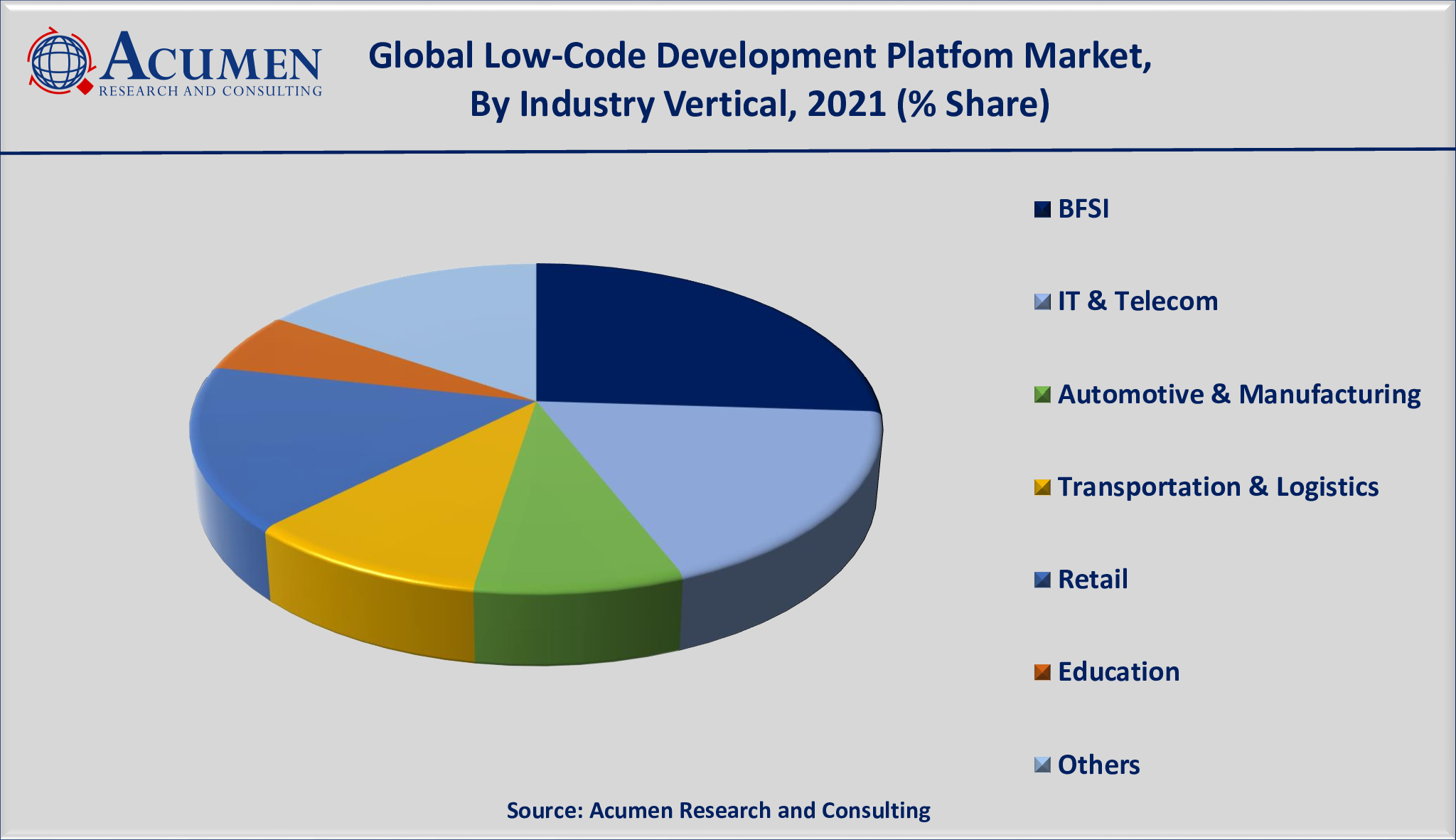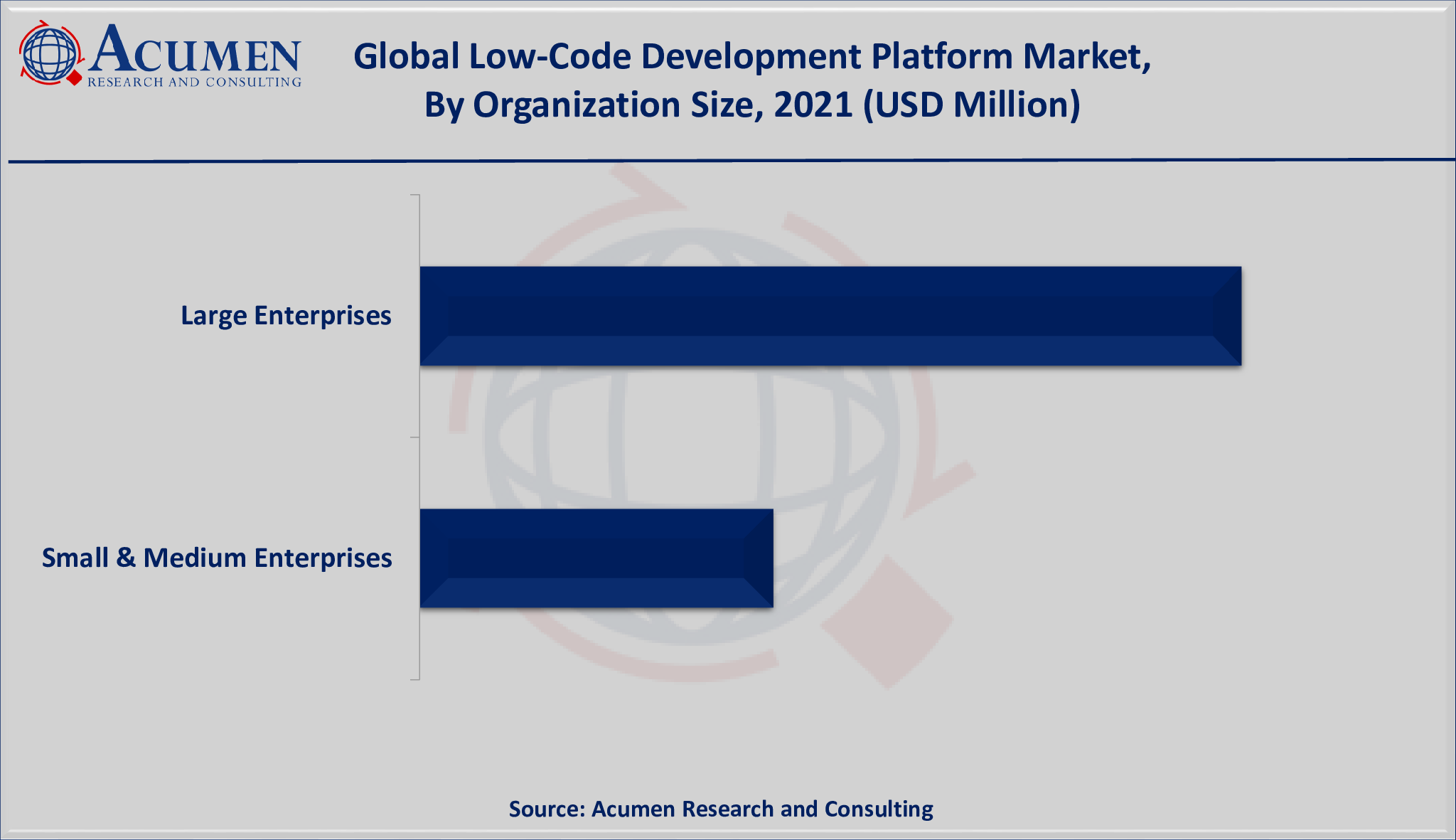Low Code Development Platform Market | Acumen Research and Consulting
Low-Code Development Platform Market - Global Industry Size, Share, Analysis, Trends and Forecast 2022 - 2030
Published :
Report ID:
Pages :
Format :
The Global Low-Code Development Platform Market Size is valued at USD 16 Billion in 2021 and is projected to reach a market size of USD 159 Billion by 2030; growing at a CAGR of 28.8%.

The primary factor driving the global low-code development platform market revenue is the increasing digital transformation in the IT industry. Additionally, increasing demand for low-code artificial intelligence is one of the global low-code development platform market trends which is expected to boost industry value from 2022 to 2030.
Low-code is a method of software development that requires little coding knowledge to create applications and processes. The low-code development framework provides a programming environment for developing software applications through graphical user interface and configuration. It saves them the time and money required for traditional hand-coded computer programming. This framework enables IT customers to integrate building blocks into apps and workflows. Visual modeling tools, scalability, security, a drag-and-drop interface, and out-of-the-box functionality are some of the advantages of the low-code development model.
Global Low-Code Development Platform Market DRO’s:
Market Drivers:
- Growing demand for rapid customization and scalability
- Increasing digitalization in numerous business processes
- Elimination of gaps in the required IT skills
Market Restraints:
- Reliance on vendor-supplied customization
- Limited software integration and customization capabilities
Market Opportunities:
- Growing need for software automation and innovative applications
- Rising digital transformation
Report Coverage
| Market | Low-Code Development Platform Market |
| Market Size 2021 | USD 16 Billion |
| Market Forecast 2030 | USD 159 Billion |
| CAGR During 2022 - 2030 | 28.8% |
| Analysis Period | 2018 - 2030 |
| Base Year | 2021 |
| Forecast Data | 2022 - 2030 |
| Segments Covered | By Component, By Application Type, By Organization Size, By Industry Vertical, And By Geography |
| Regional Scope | North America, Europe, Asia Pacific, Latin America, and Middle East & Africa |
| Key Companies Profiled | Salesforce, Inc., Appian, Microsoft, Mendix Technology BV, Creatio, OutSystems, Pegasystems Inc., Oracle, ServiceNow, Quickbase, LANSA, and Zoho Corporation Pvt. Ltd. |
| Report Coverage |
Market Trends, Drivers, Restraints, Competitive Analysis, Player Profiling, Regulation Analysis |
| Customization Scope |
10 hrs of free customization and expert consultation |
The growing need for digitalization is the primary factor driving the low-code development platform market growth. As a result of digital transformation, all types of organizations in all industries are looking for new ways to meet challenges and improve business performance. Businesses are already leveraging low-code to gain a competitive advantage by increasing business agility and efficiency. This technology enables IT teams to break down old silos between business departments. Low-code platforms, as opposed to complex coding languages, employ visual interfaces with simple logic and drag-and-drop capabilities. This allows users to master a single system, making them simple enough for almost anyone working in the facility to use. As a result, these benefits are the primary reasons why IT leaders prefer low-code to accelerate digital transformation.
According to Gartner, productivity issues, skill shortages, and business project backlogs will drive low-code solutions to account for 65 percent of application development by 2024. According to Gartner, the demand for business-related apps is five times greater than the available IT capacity. According to our low-code development platform industry analysis, these platforms can reduce the time it takes to build new apps by 90%, or from more than 6 months to less than four weeks. Many businesses have project backlogs that are costing them billions of dollars in missed opportunities. In this case, low-code platforms can help reduce backlogs by allowing the development team to accomplish more in less time.
However, reliance on vendor-supplied customization and limited software integration are some of the factors impeding the market growth. Only a few players provide the option of tailored applications that cater to business models. As a result, limited freedom for customizing applications and integration with sophisticated software limits market growth. Furthermore, the growing need for software automation and innovative applications is anticipated to create several growth opportunities for the market in the coming years.
Low-Code Development Platform Market Segmentation
The worldwide low-code development platform market is split based on component, application type, organization size, industry vertical, and geography.
Market by Component
- Platform
- Services
According to our low-code development platform market forecast, the platform gathered a significant amount of share in 2021. The high growth in the platform segment is attributed to its features such as pre-built templates, drag and drop interfaces, automated software workflow, and instant app-building capabilities. Some of the popular low-code development platforms are Oracle APEX, Microsoft Power App, Zoho Creator, ServiceNow App Engine, and others.
Market by Application Type
- Web-Based
- Mobile-Based
- Desktop/Server-Based
According to our low-code development platform industry analysis, mobile-based applications will gain a significant market share in the coming years. A mobile-based client software, a mobile middleware server, and a set of application programming interfaces (APIs) are typical components of mobile low-code development platforms. The web-based application, on the other hand, is expected to grow at the fastest rate between 2022 and 2030. A web application is considered the face of an organization, and organizations can quickly roll out user-defined web-based applications by using a low-code development platform.
Market by Organization Size
- Large Enterprises
- Small & Medium Enterprises

By organization size, the large enterprises occupied the maximum share in the coming years driven by the increasing importance of software development across these enterprises to attain seamless agility and scalability. In addition, the rising demand for digital transformation among large enterprises boosts segment growth. Small and medium-sized enterprises (SMEs), on the other hand, are expected to grow at the fastest rate in the coming years. The segment's rapid growth can be attributed to rising consumer demand for premium digital applications and fierce competition among small and medium-sized businesses.
Market by Industry Vertical
- BFSI
- IT & Telecom
- Automotive & Manufacturing
- Transportation & Logistics
- Retail
- Education
- Others

In 2021, the BFSI segment held a substantial share owing to the voluminous information produced across these organizations. In addition to that, the growing demand to digitize banking and financial services such as initiation, self-service, client onboarding, and backoffice operations is supporting segmental growth. However, the automotive and transportation segment will grow at a significant CAGR from 2022 to 2030, owing to increasing stress on manufacturing firms to revolutionize their technology in order to provide better products and services.
Low-Code Development Platform Market Regional Outlook
North America
- U.S.
- Canada
Europe
- U.K.
- Germany
- France
- Spain
- Rest of Europe
Latin America
- Mexico
- Brazil
- Rest of Latin America
Asia-Pacific
- India
- Japan
- China
- Australia
- South Korea
- Rest of Asia-Pacific
The Middle East & Africa (MEA)
- Gulf Cooperation Council (GCC)
- South Africa
- Rest of the Middle East & Africa
The increasing adoption of digital technologies in North America fuels the regional low-code development platform market growth
Among all regions, North America dominated the largest low-code development platform market value during the forecasted years. Some of the factors supporting the North America low-code development platform market include increasing digital technology adoption, the presence of significant low-code development platform providers, and early digital technology implementation. However, due to the increasing inclusion of low-code development platforms in countries such as China, India, and Japan, Asia-Pacific is poised to experience the fastest growth rate in the regional market. Furthermore, the region's improving digital infrastructure, focus on cloud platforms, and the growing number of SMEs are all assisting the Asia-Pacific low-code development platform market to grow rapidly.
Low-Code Development Platform Market Players
Some of the top low-code development platform companies offered in the professional report include Salesforce, Inc., Appian, Microsoft, Mendix Technology BV, Creatio, OutSystems, Pegasystems Inc., Oracle, ServiceNow, Quickbase, LANSA, and Zoho Corporation Pvt. Ltd.
Frequently Asked Questions
How much was the estimated value of the global low-code development platform market in 2021?
The estimated value of global low-code development platform market in 2021 was accounted to be USD 16 Billion.
What will be the projected CAGR for global low-code development platform market during forecast period of 2022 to 2030?
The projected CAGR low-code development platform market during the analysis period of 2022 to 2030 is 28.8%.
Which are the prominent competitors operating in the market?
The prominent players of the global low-code development platform market are Salesforce, Inc., Appian, Microsoft, Mendix Technology BV, Creatio, OutSystems, Pegasystems Inc., Oracle, ServiceNow, Quickbase, LANSA, and Zoho Corporation Pvt. Ltd.
Which region held the dominating position in the global low-code development platform market?
North America held the dominating low-code development platform during the analysis period of 2022 to 2030.
Which region exhibited the fastest growing CAGR for the forecast period of 2022 to 2030?
Asia-Pacific region exhibited fastest growing CAGR for low-code development platform during the analysis period of 2022 to 2030.
What are the current trends and dynamics in the global low-code development platform market?
Growing demand for rapid customization and scalability, increasing digitalization in numerous business processes, and elimination of gaps in the required IT skills drives the growth of global low-code development platform market.
By component segment, which sub-segment held the maximum share?
Based on component, platform segment held the maximum share low-code development platform market in 2021.


